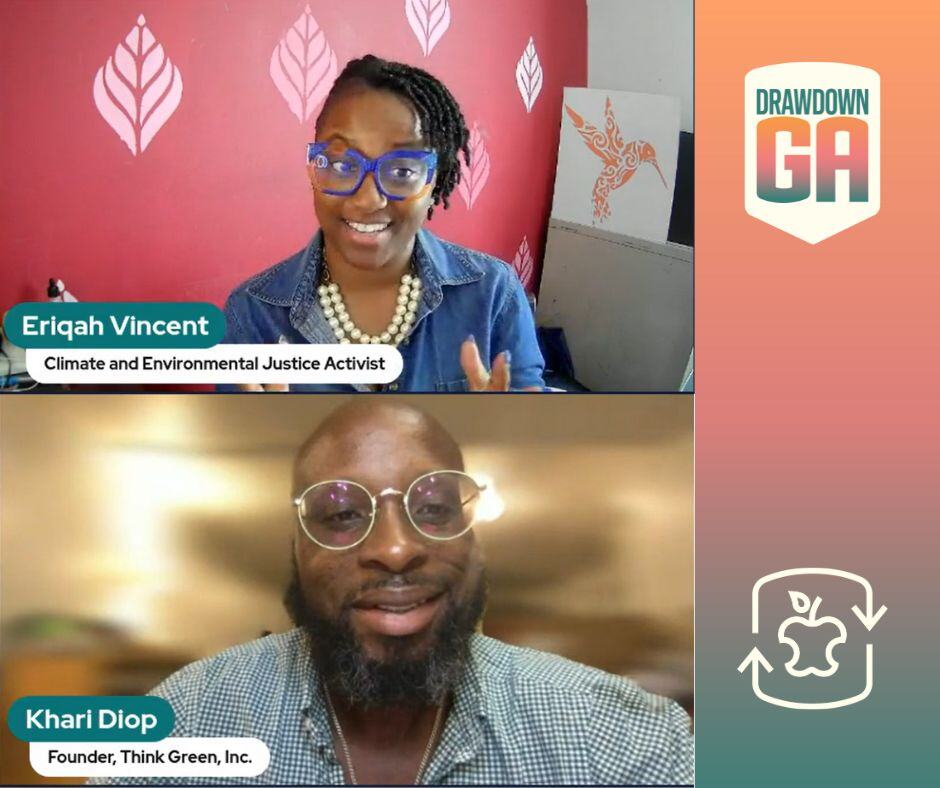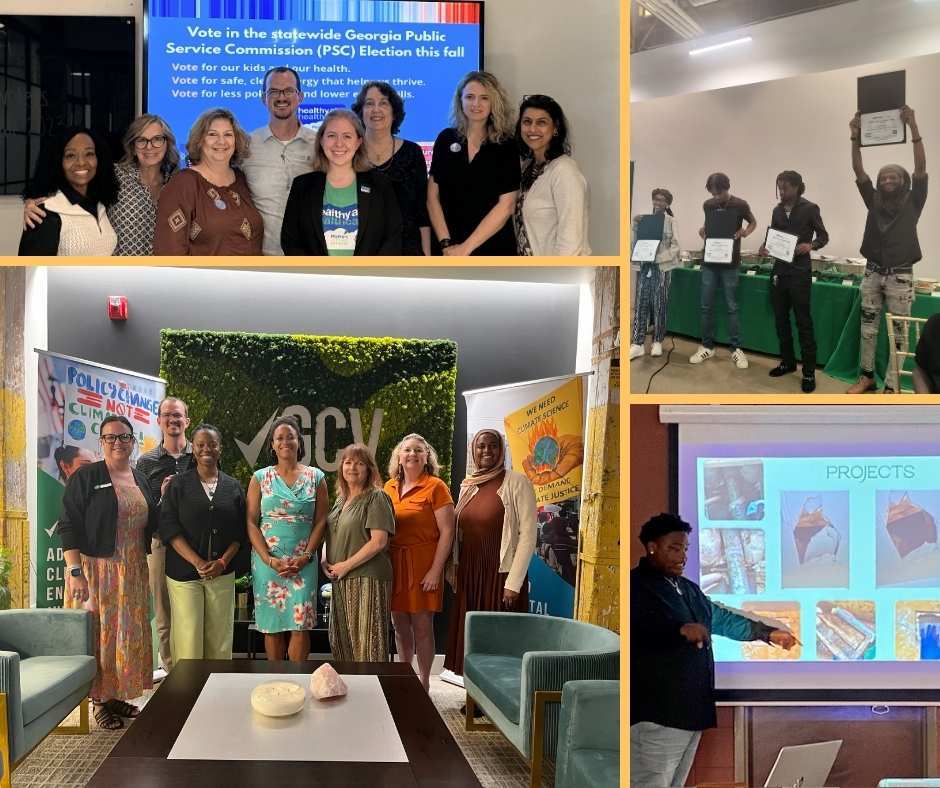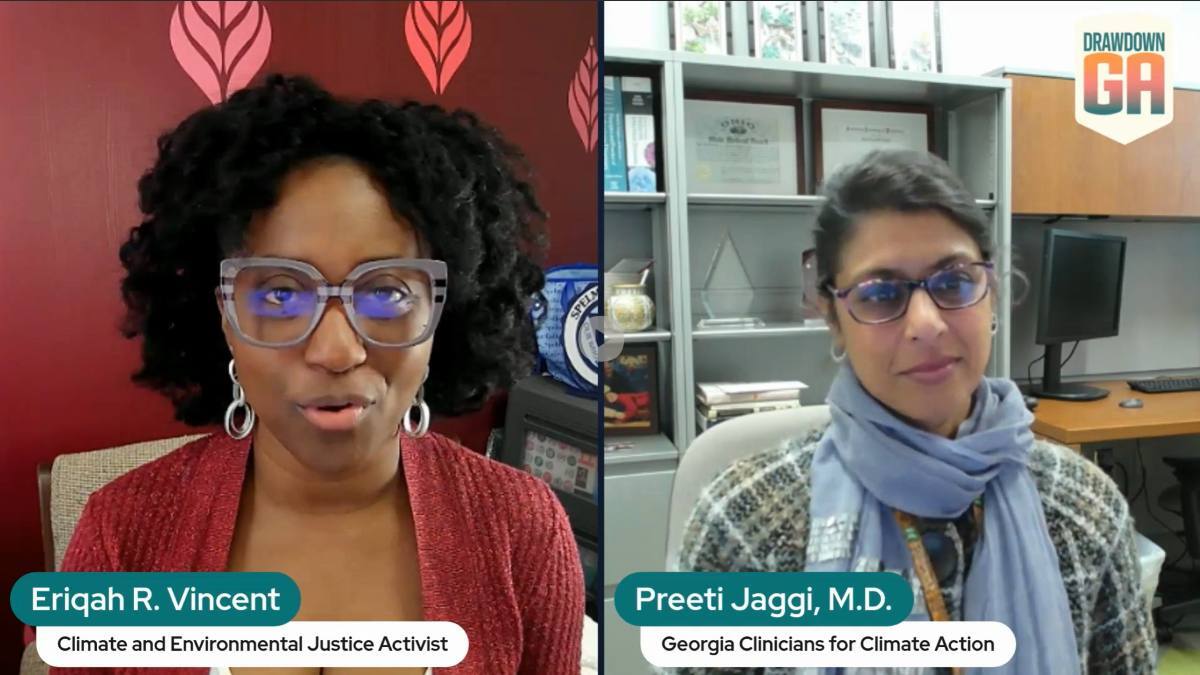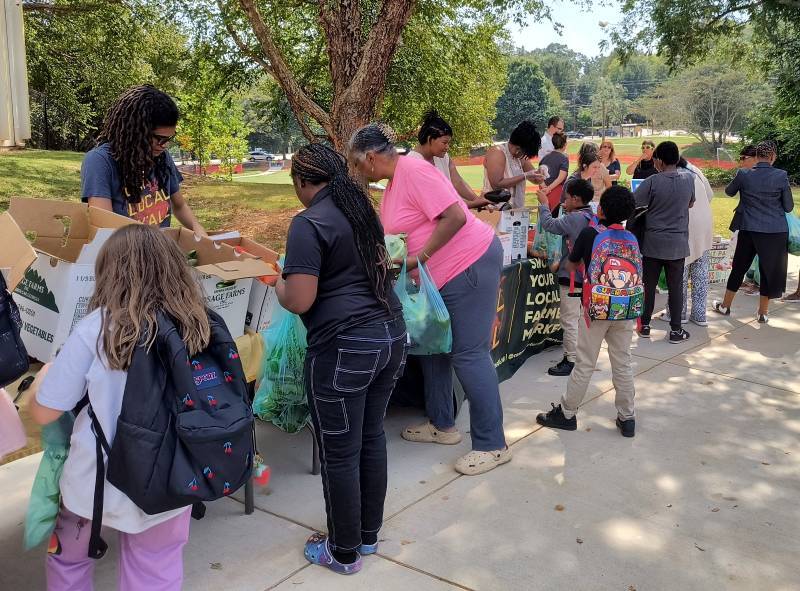Do you think of composting as something magical and majestic? If not, this conversation with expert community composter and urban farmer, Khari Diop, will change your mind.
In this interview in the Georgia Climate Digest video series, Eriqah Vincent of Drawdown Georgia speaks with Khari Diop about what inspired his 27-year career in community organizing, urban agriculture and composting.
Khari also shares tips for novices interested in getting started with gardening and composting at home.
Community Composting Video and Highlights
Highlights:
Khari talks about his career inspiration and journey, and how he was inspired by the concept of community self-sufficiency. [00:06:17 - 00:07:18]
Specific to composting, Khari talks about how he became fascinated with composting, learned from a compost guru named Corrine Coe and co-founded a compost cooperative called Terra Nova. [00:05:57 - 00:06:17]
Tips for beginners in gardening and composting start with checking out the Drawdown Georgia composting toolkit and starting small with a pile or small bin. [00:22:42 - 00:23:23]
Khari concludes with advice to start small and manageable and not to get discouraged: “Remember that you have the power to create new earth.” [00:23:00 - 00:23:23]
A lightly edited transcript follows:
Georgia Climate Digest Interview with Khari Diop of Think Green, Inc.
Eriqah Vincent: Thank you so much for being here, Khari. Let's jump right in. Tell us about yourself and about all the work you are doing around composting and urban agriculture in Atlanta.
Khari Diop: I'm a native Atlantan, and I've been involved in community gardening, urban agriculture, and the community greening movement since 1997.
Over the past 27 years, I have designed and built out gardens at homes, schools, and in communities, and also developed urban farms and composting systems. I offer education, support, and guidance for growers all across metro Atlanta.
I currently manage the Food Well Alliance's community composting lab at the Truly Living Well Center for Natural Urban Agriculture, and I have a couple of urban farms that I'm working on developing. I’m also proud to be a co-founder and member of the West Side Compost Project alongside the great team at historic Westside Gardens.
A Typical Day in Khari Diop’s Life
Eriqah: What does a typical day look like for you?
Khari: It varies from day to day. On Monday, Wednesday, and Friday, I’m mainly helping the team over at Historic Westside Gardens. I go to build out their operation, then head over to Elm Street Farm or Amigos Avenue in the morning and early afternoon. Then, I’ll usually head over to the compost lab at Truly Living Well, check in with my co-manager, Walter Davis III, and finish up whatever task we have over there, whether that's processing the incoming food scraps, screening the finished compost, cleaning up, or meeting with people.
Tuesday and Thursday, I try to dedicate time to get into my own farms: one at Atlanta Good Shepherd Church over in the West End and one at Hunger Has No Color in Oakland City. Get those in order.
Then on the weekends, I’m playing catch up with whatever I didn't get to during the week.
I'm also a father of four. I have two adult children, an eight-year-old, and a toddler. So, I’m doing my best to keep all of that family and work life in balance.
The Importance of Composting, Food Justice, and Environmental Justice
Eriqah: We know that urban agriculture is important on so many levels when it comes to food justice and environmental justice. Why are you so passionate about composting and urban ag? And what got you interested in this type of work, especially as a native Atlantan?
Khari: I mean, we all gotta eat, right? That's one thing we all have in common. Everybody eats. And for me, composting is life, it's death, and it's everything in between.
As a grower, I've been practicing sustainable and organic methods since before those were even common terms. And I've always been a consumer of compost. Since I was a youngster helping out in my family's gardens every summer, my mother would have me hauling sand, cow manure, and compost to enrich the soil so she could grow flowers, ornamentals, and herbs.
But I really became fascinated with the science and art of composting. Back in 2011, I was building out a community garden on an urban farm in the East Lake community. I was working with an organization called the Southeastern Horticultural Society, and they had been hired on by the East Lake Foundation to build a community garden with the goal of connecting folks who lived in East Lake with the surrounding community.
That community was changing rapidly with gentrification, and they were really focused on making sure that there were tangible ties between everybody who lived in the community-- and a garden is a perfect place to do that.
During that time, we had a weekly farmer's market on site. Our farmer's market manager, a woman named Corrine Coe, was a compost guru and really opened my eyes to the magic and majesty of composting.
She recruited me and a couple of other urban farmers by the name of Chris Edwards and Eugene Cook to found this compost cooperative called Terra Nova. And, you know, the rest is kind of history.
But to answer your question a little bit deeply, I've wanted to be a farmer since I was a teenager, and when I came into political consciousness, one of the basic concepts that stuck with me was the necessity of community self-sufficiency, which included food, clothes, and shelter.
I went to school for carpentry and learned how to sew. In 1997, I went through an AmeriCorps program called Eco Watch, where I met some of the pioneers of the local, community gardening and urban ag movement, like Bobby Wilson for Metro Atlanta Urban Farms; Fred Conrad with Atlanta Community Food Bank; Sheldon Fleming, an amazing community gardener and urban farmer in Decatur; and Cashawn Myers, who was the founder of an organization called, HABESHA Inc..
All of those folks were some of my early comrades and teachers and really impacted the person that I am today.
Urban Growers in Atlanta and Sankofa
Eriqah: I love to hear more about, the urban growers in Atlanta. I think it's very easy for folks to not recognize the work that especially people in the Black community are doing when it comes to growing, being outside, and being involved in farming. And certainly, we know there's a lot of historical context around the stigma. But Black people have always grown, have always composted, have always been sustainable.
Khari: You might be familiar with the term Sankofa, which means “to go back and fetch it,” or “return and fetch it.” So many of us who are involved in this are doing exactly that, going back and fetching those old traditional foodways and ways of providing for ourselves, for our families, and our communities. I think, sometimes easy, as you say, to take for granted all of the groundwork and the many years that have gone into creating this movement that's really blossoming now, which I love to see. We're definitely, involved in that Sankofa work of bringing our people back to the consciousness of where our system is, where our lives come from, which is the land.
Eriqah: And that knowledge was stigmatized based on the transatlantic slave trade. You know, it was stigmatized, so we’re going back to get it because it was stolen from us and almost demonized in such a way because of the ways that we were exploited. But that is the work that is inside of us, and so that's so important.
So I really admire the work that you are doing. I am not a grower myself, although I’d love to be.
Khari: You've got a couple houseplants around. So you are a grower.
The Diverse Skills of an Urban Farmer
Eriqah: I am keeping some houseplants alive, so I am a grower. I try to, so. I just really really admire this work. What is something that might surprise us about the work that you do?
Khari: Probably the diversity of skills that I get to use on a daily basis. Of course there is agricultural production, but also mechanic work, business development, accounting, and community organizing. Oftentimes, I think that we get a certain idea about what it is that an urban farmer or agriculturalist does, but really, we are small business owners and we are community stewards. So, if you name it, I probably do it.
Equity, Food Justice and Urban Farming
Eriqah: Yes, I love that. How does your work connect to the issues of equity and food justice as well as climate and environmental justice in the state of Georgia?
Khari: I've lived and worked in predominantly Black and Brown communities for all of my life, so those issues have been intrinsic in my daily existence since the get-go. I don't even call them out much anymore, they’re just woven into my every waking breath. But a long time ago, I recognized the necessity of ensuring that our communities were food secure.
Many people are familiar with the terms food desert or even food swamp, and the need for us to try to move towards food sovereignty, where we are controlling the production, the distribution, and the recovery of the resource, and the blessing, that is food.
So, each and every one of those very important issues is infused into everything that I do. I know that often our communities - the newest term I've heard is frontline communities - are most affected by the sort of negative aspects of climate change. So I'm honored that I'm able to institute some solutions on the ground, right in these communities.
Eriqah: Yeah. A lot of the communities that you're working with, I'm very familiar with, having gone to school in Atlanta. I remember when I was at Spelman, we had a Publix that I went to to get food on campus. And then we didn't. We had a Walmart, and then we didn't. And then that area did become a space where we couldn't get fresh food.
I’m so glad to see the work that you all are doing at Historic Westside Gardens, at Think Green, and at Truly Living Well get the recognition that you deserve both from a media standpoint and from a communication standpoint because I think it's so valuable, important, and necessary.
Expanding Community Composting with a Drawdown Georgia Grant
So speaking of Truly Living Well, Think Green, and Historic Westside Gardens, you all received a Drawdown Georgia Climate Solutions & Equity Grant. Congratulations.
Khari: Thank you.
Eriqah: Tell us more about how that grant has helped expand the work being done by these organizations. I can only imagine, but I'd love to hear some examples from you.
Khari: Yeah, this grant has been such a boon, such a blessing. It has helped us improve the infrastructure of the community composting lab and create a whole new community-based and led enterprise, Westside Compost, which, I'm proud to say, has picked up one ton of food waste from our community members in the past month.
It's grown exponentially, and it's really one of my proudest accomplishments of the past few years to see this team that has grown and reached into the community and met our people where they were at. We have changed the paradigm for what we're doing with what was formerly considered our food waste, but is now recognized as our food resource.
And none of it would have been possible without these critical funds from the amazing family foundations that support the Drawdown Georgia Climate Solutions & Equity Grant and the whole Drawdown Georgia movement. We're feeling especially blessed and optimistic.
We've actually partnered with ECO-Action, which is, another sort of legacy community uplift organization. And they are now spreading the gospel of community composting to all of the communities that they're working in. And we're working hand in hand with them to bring more people into the fold.
Inspiring More Community Composting in Urban Areas
Eriqah: What are the goals for the future of these organizations and the future of the work that you all are doing in the community composting space as well?
Khari: Well, we want to keep on educating our folks about the power that they hold to combat climate change by keeping food out of the landfills and pushing the envelope on the homegrown solutions of local food production and community composting. Pedal to the metal. We're not letting up. We want to keep on keeping on.
Eriqah: How do you want to inspire more communities? Atlanta is ripe for this type of inspiration when it comes to urban ag. How are you looking to inspire more communities, both around the state and around the country?
Khari: We're going to continue to grow our membership base. Right now we're doing residential pickups, where we're actually going to folks' homes and picking up buckets of food scraps from them on a weekly basis. Our goal was to reach 100 families, by the end of this year, and we’re on track to do that. We also have, a couple of businesses that we pick up from as well.
We want to continue to grow that and just serve as an example of a way that this can increase the economic mobility of the community, the environmental sustainability of the community, and the cohesiveness of the community. As we're growing together and composting together, we are really coming together and getting to know our neighbors, and educating each other.
The Drawdown Georgia Home Composting Toolkit
Eriqah: Absolutely. I think so many communities could benefit from some of that wisdom. I'm hoping that people from other places also see this and are inspired. Speaking of Drawdown Georgia, you coauthored Drawdown Georgia's “How to Compost at Home in Georgia” toolkit. Drawdown Georgia has lots of toolkits for Georgians to reduce carbon emissions in lots of different ways. Tell us a little bit more about your toolkit and why Georgians should take a look at it.
Khari: Yeah, I coauthored that toolkit along with the former executive director of Truly Living Well, Carol Hunter, and the current executive director of Historic West Gardens, Rosario Hernandez. It's a basic primer for anyone who's interested in learning about the power and impact of the process of composting in all its forms, from backyards to small farms.
I think it really gives folks an eye-opening education about what it is that they can do, right in their own homes, to combat climate change and keep food waste out of landfills. I would encourage everybody to check it out. If you're looking for a starting place for information that you can trust, check out our toolkit.
Eriqah: Yes, please, I will be checking it out for my own home. You told me I'm a grower, so I appreciate that. I'm going to take that to heart.
Khari: We need as many as we can get at this point. You know, Black farmers make up 1% of farmers nationally. So we want to encourage as many people to dig in the dirt again as possible.
Advice for Composting Beginners
Eriqah: So what advice do you have for me, selfishly, and for anyone who wants to start composting or even growing in their own home? What starting advice do you have for us?
Khari: I would say check out the toolkit. First and foremost, get engaged. Educate yourself. You know, there's a world of knowledge online and out in the community, and the metro Atlanta region is blessed to have community gardens all over the place.
As far as composting, I would say, build a pile or buy a small bin if you can afford it. And start small. Start manageable. Don't get discouraged. You can do it. It's not rocket science, but it is addictive. Once you see that you have the power to create new earth, your life will never be the same.
Eriqah: That's powerful. That's powerful. I feel like there's divine messaging in that. So thank you so much for sharing all your knowledge and wisdom with us today.
Khari Diop’s Hope for Community Composting and Climate Solutions in Georgia
As we close, my last question for you is: what is giving you hope around climate solutions in our state of Georgia?
Khari: I get inspired by all the work that I see and learn about in the Drawdown Georgia’s Georgia Climate Digest newsletters. I'm just amazed at everything that's going on in every corner of the state. I mean, we really got it going on in Georgia and the movement is growing so fast. I feel like people are finally getting it and getting active. And I believe in us. You know, I honestly believe that we can create the solutions together. I think that we can solve this problem and create a better future for ourselves and for all those generations that are to come.
Eriqah: Absolutely. Thank you so much, Khari. Thank you for your work. Thank you for your wisdom. Thank you for what you shared with us today. Thank you for calling me a grower. I'm gonna tell everybody, and I appreciate you. God bless all the work that you all are doing. I hope you can continue to do it and I hope that folks continue to see the power and continue to want to support the work that you are doing, because I think it's really, really important. So thank you again for being with me.
Khari: And I appreciate it. Thank you.
Eriqah: Thanks, everybody for joining us. We'll see you next time.
Subscribe for Future Interviews + Uplifting News on Climate Solutions in Georgia
Our next interview will take a deep dive into home energy efficiency as a climate solution in a conversation with Mike Barcik of Southface. Subscribe now to the Georgia Climate Digest to receive this and future Georgia Climate Digest video interviews right in your inbox, along with updates about our progress on climate solutions. Click the button below to subscribe.









